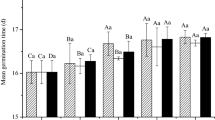Abstract
WHILE investigating the physiology of germination, it was noted that micro-organisms occurring on the seeds of certain species proliferated rapidly during germination, whereas the seeds of some other species, germinating under the same conditions, remained sterile. It seemed obvious that certain seeds must contain and release—during germination—compounds that are able to inhibit the growth of certain micro-organisms. In order to examine this hypothesis, the antibacterial effect of seeds of several species and varieties of plants has been investigated.
This is a preview of subscription content, access via your institution
Access options
Subscribe to this journal
Receive 51 print issues and online access
$199.00 per year
only $3.90 per issue
Buy this article
- Purchase on Springer Link
- Instant access to full article PDF
Prices may be subject to local taxes which are calculated during checkout
Similar content being viewed by others
References
Köhler, H., Nachrich. Deut. Pflanzenschutz., 8, 1 (1954).
Ferenczy, L., Acta Biol., Szeged, 1, 17 (1955).
Culpepper, V. L., and Ableson, M., J. Lab. Clin. Med., 6, 415 (1921).
Osborn, E. M., Brit. J. Exp. Biol. Med., 24, 227 (1943).
Ivánovics, Gy., and Horváth, I., Nature, 160, 297 (1947).
Horváth, I., and Ivánovics, Gy., Experientia, 5, 74 (1949).
Author information
Authors and Affiliations
Rights and permissions
About this article
Cite this article
FERENCZY, L. Antibacterial Substances in Seeds. Nature 178, 639–640 (1956). https://doi.org/10.1038/178639a0
Issue Date:
DOI: https://doi.org/10.1038/178639a0
This article is cited by
-
Antibakterielle und antifungale Hemmstoffe in höheren Pflanzen
Forstwissenschaftliches Centralblatt (1964)
-
The antibacterial action of some 1-substituted anthraquinone-2-carboxylic acids
Die Naturwissenschaften (1961)
-
An antibacterial preparatum from hemp (Cannabis sativa L.)
Die Naturwissenschaften (1958)
Comments
By submitting a comment you agree to abide by our Terms and Community Guidelines. If you find something abusive or that does not comply with our terms or guidelines please flag it as inappropriate.


